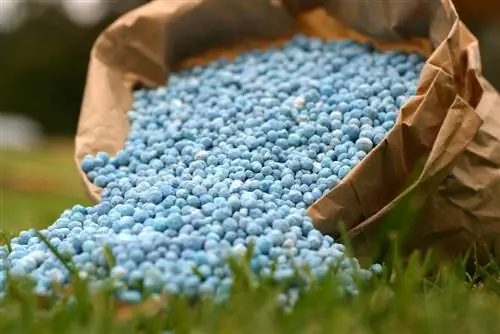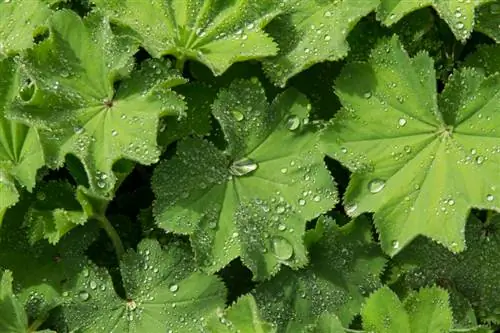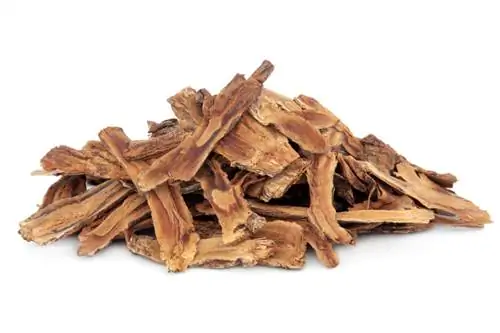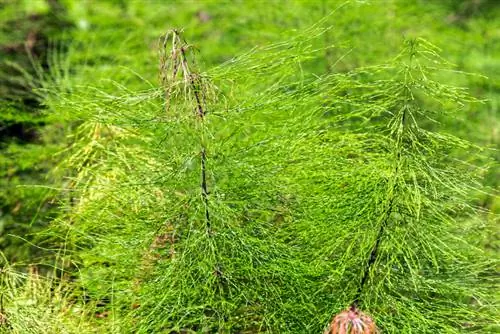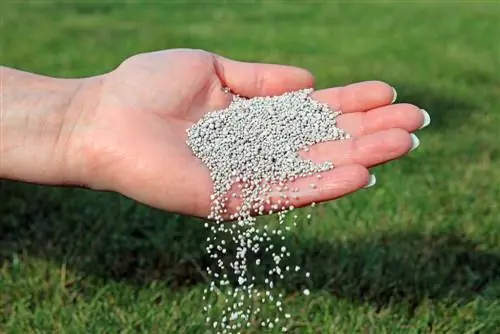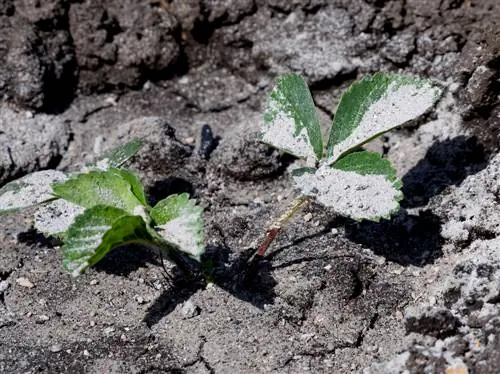- Author admin leonars@hobbygardeners.com.
- Public 2023-12-16 16:46.
- Last modified 2025-06-01 06:02.
NPK fertilizers are considered an all-round talent when the vegetables in the garden are weak. Very few hobby gardeners know that they harm their plants and the soil in the long term. It is very important to understand how these fertilizers work. Organic alternatives are better.
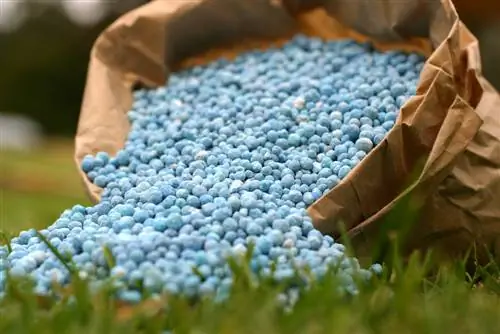
What should you know about using NPK fertilizers?
NPK fertilizer consists of nitrogen (N), phosphorus (P) and potassium (K), which are essential for plant growth. When used correctly, this fertilizer is not harmful, but improper use and over-fertilization can have negative effects on people, animals and the environment. Organic alternatives such as compost or animal manure are more environmentally friendly options.
What is NPK fertilizer?
The core nutrients of a complete fertilizer are nitrogen, phosphate and potassium. Such compositions are also called NPK fertilizers, which is derived from the symbols of the chemical elements. The concentration of the individual nutrients is given in percentages.
Content information on the NPK fertilizer: composition
Information on the packaging of the NPK fertilizer such as 15-15-15 or 10 52 10 states that the fertilizer contains either 15 percent nitrogen, phosphate and potassium or ten percent nitrogen, 52 percent phosphate and ten percent potassium contains. If another number is listed, it indicates the magnesium content.
This is what plants need:
- Nitrogen: promotes the growth of the green parts of the plant
- Phosphorus: supports the development of flowers and fruits
- Potassium: regulates the water balance and strengthens the plant tissue
This is what an NPK fertilizer brings: Application
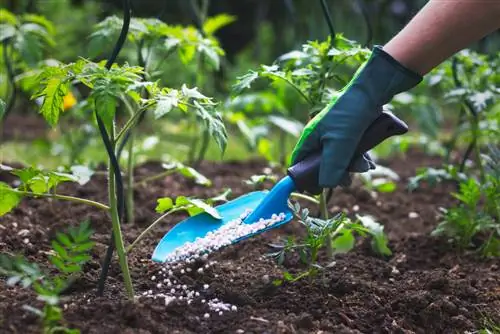
NPK stands for nitrogen (N), phosphorus (P) and potassium (K)
The composition provides information about the possible uses of the fertilizer. They give the plant everything it needs to grow. The complete fertilizers can be used both for basic care and for top-up fertilization. The mixtures are spread by hand or added to the irrigation water. An oversupply of individual components can negatively affect growth.
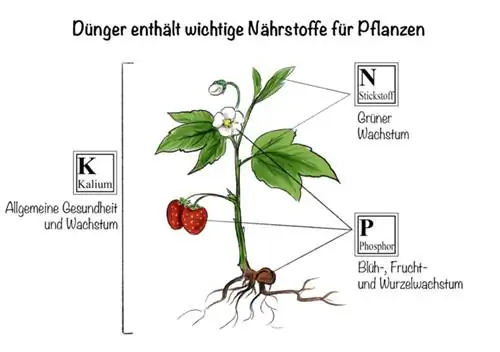
Nitrogen
Plants need this element for he althy growth. Nitrogen is a component of the plant pigment chlorophyll and proteins. In its gaseous state, it makes up 78 percent of the air, although plants can only absorb nitrogen in the form of nitrate or ammonium ions. This happens via the roots, which is why special fertilizers are administered to the soil. NPK fertilizers for lawns are nitrogen-based and are mainly applied in spring. A nitrogen deficiency is noticeable through light green leaves and an oversupply through blue-green leaf mass.
Phosphorus
To prevent permanent, irreversible plant damage, you should give your plants phosphorus. Phosphorus-based fertilizers are used where plants bloom poorly or have reddish undersides of leaves. They are mainly intended for beds and hedges with flowering ornamental plants and balcony flowers. However, the soil has an influence on how much phosphorus a plant can absorb. Plants are less able to absorb the element if the soil is too moist, compacted or the pH value is too low. An overdose of phosphorus leads to poor growth.
Potassium
If the leaves of your ornamental plants hang limply despite a good supply of water, this may be due to a potassium deficiency. Use a potassium-rich complete fertilizer. Herbs and green plants need more potassium and nitrogen. Their need for phosphorus is lower because flower development is not important to them. Heavy-feeding vegetable plants produce higher yields if they are adequately supplied with potassium. Oversupplied plants often develop brown leaf edges.
Can I use NPK fertilizer in the aquarium?
Aquarium plants also need these nutrients for he althy growth. When choosing, you should make sure that the complete fertilizer is suitable for the aquarium. Which fertilizer you choose also depends on your water parameters. There are often nutrients in the starting water that enter the water through feeding or stocking. Nutrients that are already present should no longer be administered.
How to fertilize the aquarium:
- Measuring water parameters such as iron, nitrate and phosphate
- Select complete fertilizer (NPK), mixed forms (PK, NP, NK) or individual components (N, P or K) according to the values
- Adjust nutrient concentration to the tank
- bring other water values such as CO2 and light into the optimal range

Is NPK fertilizer toxic?
Heavy metals play a role in human he alth. They are absorbed from the soil by plants and thus enter the food chain. These elements are toxic in high concentrations, but both plant organisms and humans need essential trace elements for important metabolic processes. Some NPK fertilizers may contain additional trace elements in addition to the main nutrients, which is why you should pay attention to the exact composition.
NPK fertilizer is toxic if used improperly.
Bluegrain
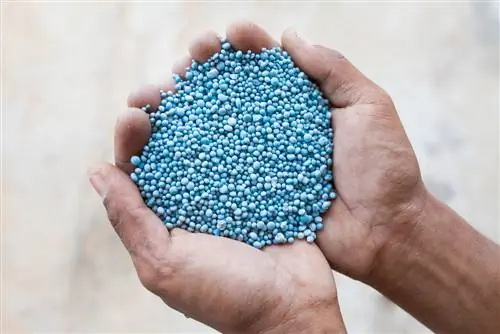
Blue grain is also an NPK fertilizer
These blue colored beads are also NPK fertilizers. In addition to the main nutrients, blue grain also contains magnesium and sulfur, although the concentrations of the individual substances vary depending on the recipe. This complete mineral fertilizer is chemically produced and, like comparable NPK fertilizers, can cause various problems.
Poisonous - for animals
If pets accidentally eat the blue-colored grains from the bed, he alth damage can occur. Consumption leads to bloody diarrhea, salivation or vomiting, as well as shortness of breath and tremors. The circuit can collapse, which in the worst case can be fatal.
If you suspect that your pet has eaten blue corn, you should observe it and consult a veterinarian at the first symptoms. Make sure the animal's airways remain clear and do not try to induce vomiting. A possible treatment method is the administration of charcoal tablets to bind the toxins.
Toxic - for humans
The nitrate contained in NPK fertilizers is converted into nitrite in the plant or human body. In large quantities, this substance can cause blueness. Small children in particular should not come into contact with the fertilizer. In blueness, an increased level of methemoglobin occurs, which disrupts the oxygen supply. Dizziness, confusion and headaches occur. In severe cases, coma-like conditions occur that can be fatal. Blueness is treated with a blood transfusion.
Toxic - for the environment
Most garden soils are oversupplied with certain nutrients and do not require complete fertilizer. Unused elements are washed out or accumulate in the soil. This affects the microorganisms in the soil and water. Nitrogen is difficult to store in the soil. If the element enters the groundwater as nitrate, it is not far from reaching drinking water.
Consequences for agriculture:
- Agriculture focuses on a few types of crops that are favored by mineral fertilizers
- nitrogen-fixing legumes or undemanding crops are meaningless
- further measures required to maintain the humus layer
- weak-competitive plants and species from poor locations are pushed back
- Species diversity is being lost
Mix your own NPK fertilizer
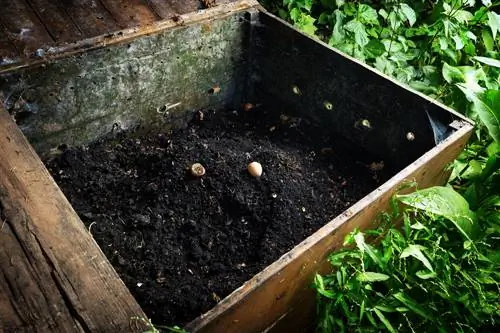
Compost is a good alternative to chemical NPK fertilizers
If you have a liquid fertilizer at home that does not offer the optimal nutrient concentration, you can mix it yourself with purchased individual components. However, it takes a bit of sensitivity to bring the individual substances into the desired ratio. Therefore, you should consider alternative organic fertilizers that are similar to an NPK fertilizer.
Tip
Liquid fertilizers with a pH value that is too high can be neutralized with a dash of salad vinegar. Obtain a test strip to check the value.
Make organic fertilizers
Such mixtures contain natural components that are decomposed by microorganisms in the soil. The nutrients are not immediately available to plants, which reduces the risk of over-fertilization. Compost is an ideal fertilizer whose NPK concentration varies depending on the composted material. Be careful about what you dispose of in the compost and add animal substances if necessary.
| Nitrogen | Phosphorus | Potassium | Other | |
|---|---|---|---|---|
| Banana peels | - | - | x | high magnesium content |
| Stinging nettles | x | - | - | Manures have a high pH value |
| animal manure | x | x | x | depending on the animal species in different concentrations |
| Coffee grounds | x | x | x | contains minerals |
| Ashes | - | x | x | has a strong alkaline effect |
Dosing NPK fertilizer correctly
How many nutrients a plant needs depends on the growth stage and soil conditions. For plants that are grown in a greenhouse under controlled conditions, the optimal nutrient concentration is easier to achieve than in the field under fluctuating conditions. The following example shows which concentrations of NPK fertilizer the hemp needs in the individual growth phases.
Excursus
Hemp cultivation in Germany
Cannabis can be purchased legally in Germany because it is considered a prescription medicine for patients with chronic pain. However, growing hemp is illegal. The intoxicating herb may only be grown and harvested for a limited period of time with a special permit. Such special permits are issued for research purposes. The majority of medicinally used hemp products are imported. In the coming years, the demand for cannabis will be covered by German cultivation.
Vegetative phase
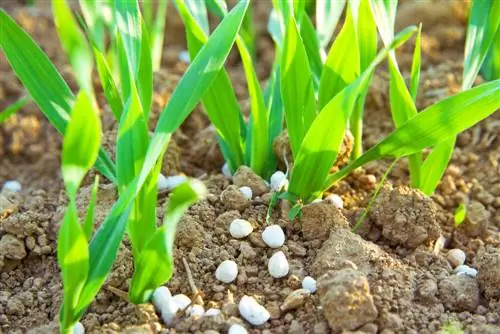
Seedlings should only receive a small dose of NPK fertilizer
Seedlings with one or two pairs of leaves require few nutrients. A concentration of 2-1-2 NPK is sufficient to stimulate plant growth. As the number of leaves increases, the need for nutrients also increases. As soon as the young plants have developed five pairs of leaves, they are optimally supplied with a 4-2-3 fertilizer.
Then the need for nitrogen increases quickly. To promote strong growth, plants require an NPK concentration of 10-5-7. Only in the late vegetative phase does the nitrogen requirement drop by around 25 percent. Shortly before flowering, values of 7-7-7 are sufficient.
Generative Phase
During the early flowering phase, hemp requires a high level of phosphorus, so NPK values of 5-10-7 are optimal. Subsequently, continuously increased concentrations ensure balanced growth, with the entire flowering phase being accompanied by a predominant proportion of phosphate. During the middle phase, concentrations of 6-15-10 are optimal. As the flowering period comes to an end, the nutrient requirement slowly reduces. NPK fertilizers with values of 4-10-7 provide sufficient elements.
Advantages and disadvantages
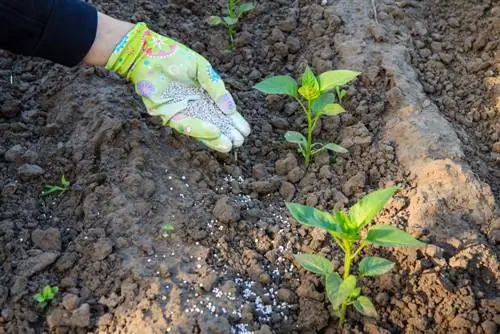
NPK fertilizers are practical but harmful to the environment
NPK fertilizers are extremely convenient. They ensure improved growth in the short term when deficiency symptoms occur. Therefore, such products are used not only in agriculture, but also in private gardens when growing vegetables. The plants are completely supplied and can absorb the nutrients directly from the soil without having to be made available by microorganisms. Compared to organic alternatives, NPK fertilizers are inexpensive. Blaukorn costs between one and four euros per kilogram.
Disadvantages of improper use:
- Environmental pollution: unused nutrients enter the groundwater through leaching and pollute the soil
- Short-termism: in the long term, soil fertility and crop yields decline
- Growth disorders: unbalanced nutrient concentration leads to shoots and prevents flower development
Tip
To benefit from the benefits of NPK fertilizers, you should first carry out a soil test. Administer individual components if necessary and avoid complete fertilizer.
Frequently asked questions
What types of NPK fertilizers are there?
A mineral NPK fertilizer consists of inorganic substances. This is mainly made from water-soluble s alts that are of synthetic origin. Complete fertilizers contain additional trace elements. The s alts are offered in liquid or solid form. Organic NPK fertilizers are not NPK fertilizers in the true sense. Their nutrients come from plant or animal raw materials. There is also an intermediate form called organic-mineral NPK fertilizer. These consist of synthetic materials to which organic substances such as horn meal have been added.
How much NPK fertilizer per 1 ha of grassland?
How high the nutrient requirement of grassland depends on the cutting intensity and the types of grass present. Intensively used areas where high-quality grass mixtures thrive have a nitrogen requirement of 240 to 300 kilograms per hectare. However, there are regulations as to how much NPK fertilizer can be applied. A maximum of 170 kilograms of nitrogen may be applied to grassland per hectare per year. A soil analysis provides information about how much NPK fertilizer is needed and in what concentration.
What are the prices of NPK fertilizers?
Prices vary depending on the manufacturer and composition. The usual basic price per kilogram is between 80 cents and two euros, although this price drops for larger quantities. This means that mineral NPK fertilizers are significantly cheaper than organic alternatives. Here the price per kilogram fluctuates between three and five euros. Homemade fertilizer made from biological waste is free of charge.
Examples of prices:
- 25 kg NPK fertilizer (15-15-15): approx. 22 euros
- 50 kg NPK fertilizer (10-6-18): approx. 42 euros
- 100 kg NPK fertilizer (15-10-10): approx. 95 euros
Are NPK fertilizers harmful to he alth?
Mineral fertilizers available in Germany must not have any harmful effects on he alth or the environment. Therefore, proper use is important. If fertilizers are not misused, they are considered harmless.
Because NPK fertilizers consist of soluble s alts, the dust on the skin or in the eyes when combined with water can cause irritation or drying out. Improper use such as consumption can cause he alth damage. To protect children or pets, the fertilizer should always be worked into the soil and never stored freely accessible.

